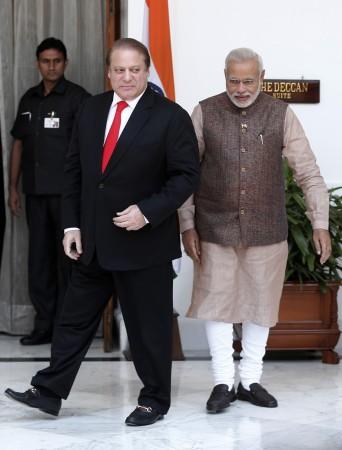
A day after the Indian government called off talks with Pakistan after its envoy in Delhi held talks with Kashmir separatists, Hurriyat leaders remained defiant and met Pakistan High Commissioner Abdul Basit on Tuesday, claiming that Kashmir is an "international issue".
India-Pakistan relations plunged drastically on Monday after the Modi government decided to call off the secretary-level talks scheduled for 25 August, after Basit met Kashmiri separatist leader Sabir Shah.
The meeting between the foreign secretaries would have been the first in 18 months, but now, the prospects for any such meeting in the near future look bleak. This is the first time that talks between the two governments have broken down over the Kashmir separatists' meeting with Pakistani officials.
What seems to have worsened the matter is the defiant stand taken by Pakistan in going ahead with the meeting with separatists, and inciting India by stating that the Kashmir issue was still unresolved.
In response to India's decision to call off talks, Pakistan stated that it "did not need India's permission" to talk to Hurriyat leaders.
Pakistan's foreign office spokesperson told NDTV that "The Kashmir issue was still in the United Nations," clearly hinting that Pakistan still had the right to engage in Kashmir, which India chooses to call as its "internal affairs".
This episode may have caused irreparable damage to the historically strained Indo-Pak ties, and it may all be downhill from here. The Modi-Sharif meet scheduled for next month is likely to be called off in the wake of this episode.
The move by the government comes just days after Modi rebuked Pakistan for waging a "proxy war of terrorism" and questioned Pakistan's military capabilities stating that it was not in a position to engage in conventional war with India.
These developments indicate a breakdown of India-Pakistan relations, which seemed to have appeared brighter after Modi invited Pakistani Prime Minister Nawaz Sharif for his oath-taking ceremony in May and engaged in what popularly came to be referred to as 'Sari Diplomacy'.
The August meeting between the secretaries of the neighbouring nations was, in fact, scheduled just after the Modi-Sharif meet, in keeping with the positivity around the meet. In fact, Sharif had refrained from meeting with separatists during his visit on the insistence of the Indian government.
Other nations such as the United States had applauded Modi's regional diplomacy and the improving relations between the nuclear-armed neighbours.
But on Tuesday, the United States State Department said it was "unfortunate" that the talks were called off. According to news reports, the issue could be brought up during Modi's visit to Washington next month.
The separatists called the Indian government's decision an "over-reaction", and chided India for not trying to resolve the Kashmir issue.










!['Lip lock, pressure, pyaar': Vidya Balan- Pratik Gandhi shine in non-judgmental infidelity romcom Do Aur Do Pyaar [ Review]](https://data1.ibtimes.co.in/en/full/797104/lip-lock-pressure-pyaar-vidya-balan-pratik-gandhi-shine-non-judgmental-infidelity-romcom.jpg?w=220&h=138)






